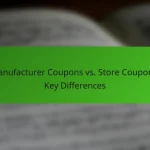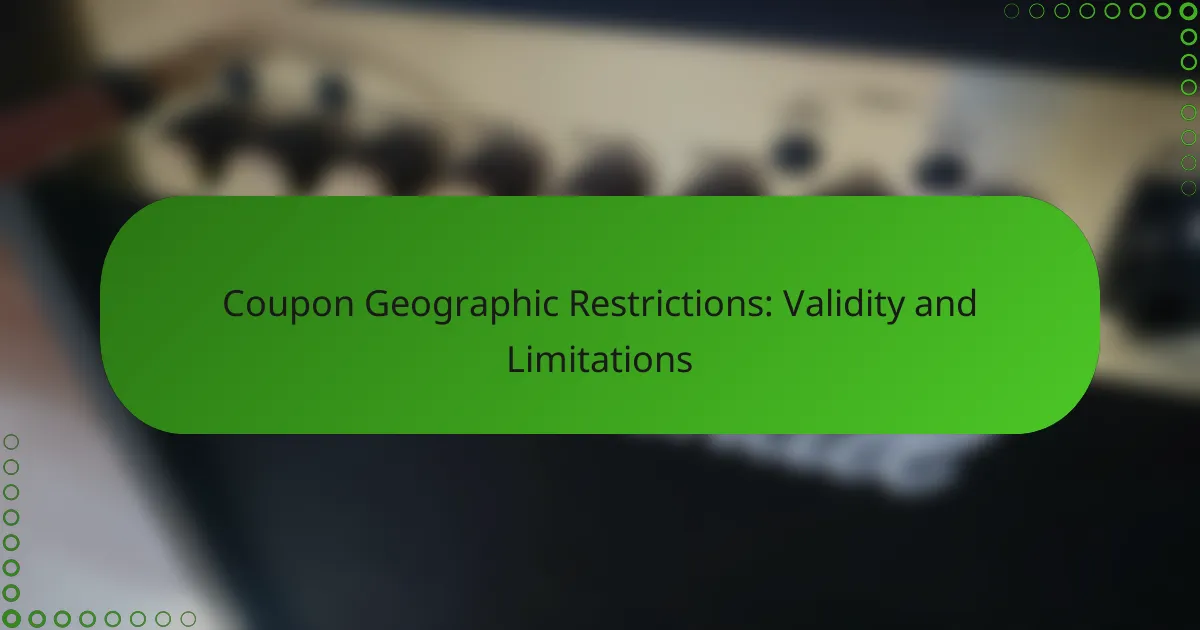Coupons frequently include geographic restrictions that determine their validity based on specific locations, such as regions, states, or cities. These limitations can affect both consumers and businesses, influencing where and how coupons can be redeemed. Understanding the terms associated with these restrictions is essential for maximizing savings and ensuring proper usage.
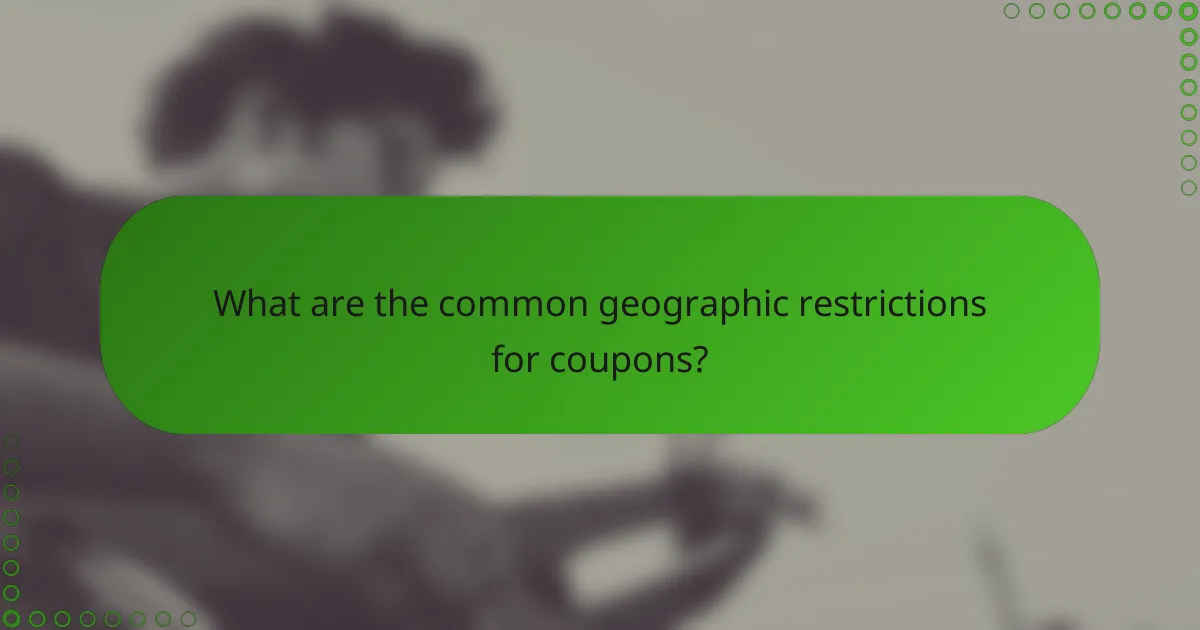
What are the common geographic restrictions for coupons?
Coupons often come with geographic restrictions that limit their use to specific areas. These limitations can vary by region, country, state, or even city, impacting where and how consumers can redeem them.
Regional validity
Regional validity refers to the specific areas where a coupon can be used. For example, a coupon may be valid only in certain states or provinces, which means consumers outside those areas cannot redeem it. Always check the fine print to ensure your location is included in the valid regions.
Country-specific limitations
Many coupons are designed for use in particular countries, reflecting local pricing, taxes, and regulations. For instance, a coupon for a product sold in the United States may not be valid in Canada or Europe. When shopping internationally, verify if the coupon applies to your country to avoid disappointment.
State or province exclusions
Some coupons may exclude certain states or provinces due to varying tax laws or distribution agreements. For example, a retailer might offer a coupon valid in most of the U.S. but exclude states like Alaska or Hawaii. Always read the terms to identify any exclusions that may apply to your location.
City-specific offers
City-specific offers are promotions that are limited to particular urban areas. A coupon might be valid only in major cities like New York or Los Angeles, making it unusable in smaller towns or rural areas. Check for city restrictions to ensure you can take advantage of the offer.
Online vs. in-store restrictions
Coupons may have different restrictions based on whether they are used online or in-store. Some coupons are exclusively for online use, while others can only be redeemed at physical locations. It’s crucial to confirm the redemption method to avoid any issues at checkout.
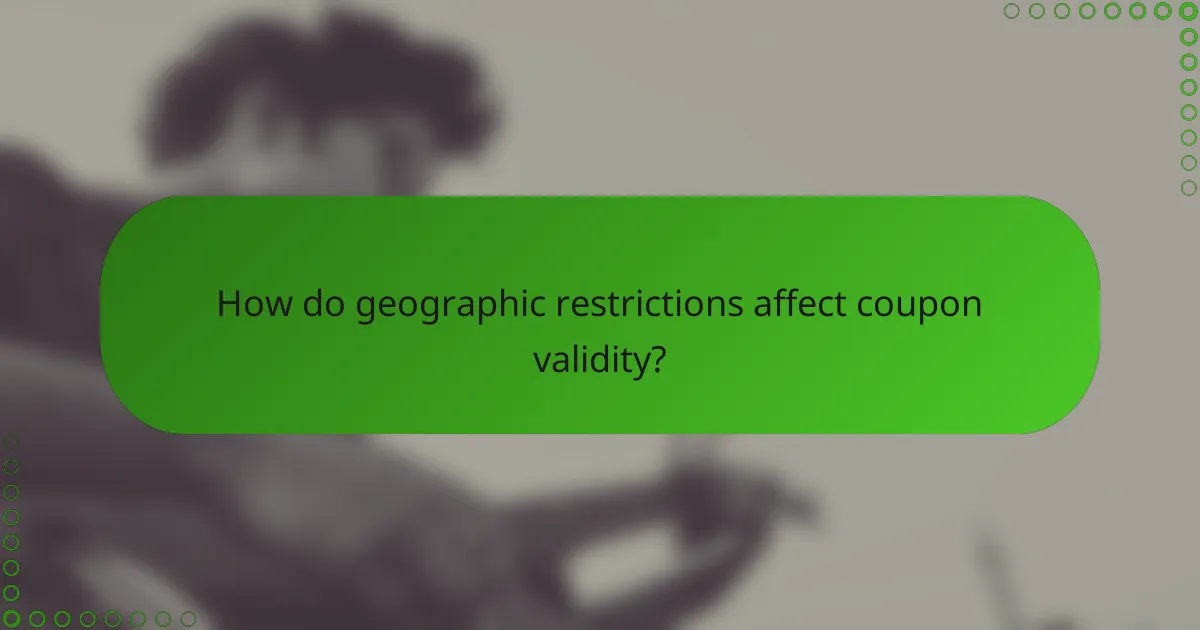
How do geographic restrictions affect coupon validity?
Geographic restrictions can significantly limit coupon validity, as they often dictate where and when a coupon can be used. These limitations can vary by region, affecting both consumers and businesses in terms of accessibility and redemption opportunities.
Impact on redemption rates
Geographic restrictions can lead to lower redemption rates for coupons, as consumers may not be aware of the limitations or may not live in the eligible areas. For instance, a coupon valid only in specific states may see minimal use if consumers from other regions attempt to redeem it. Businesses should consider these factors when designing promotional campaigns to maximize engagement.
To improve redemption rates, companies can target their marketing efforts to specific demographics or regions where the coupons are valid. This can help ensure that the intended audience is aware and able to use the coupons effectively.
Consumer awareness challenges
Consumers often face challenges in understanding the geographic restrictions associated with coupons. Many may overlook fine print or assume that a coupon is valid nationwide, leading to frustration at the point of sale. Clear communication about where and how coupons can be redeemed is essential for consumer satisfaction.
Businesses should provide explicit details about geographic limitations in their advertising and on the coupons themselves. Using bold text or highlighted sections can draw attention to these restrictions, helping to mitigate confusion and enhance customer experience.
Legal implications
Geographic restrictions on coupons can also have legal implications, particularly regarding advertising laws and consumer protection regulations. Companies must ensure that their promotional materials comply with local laws to avoid potential penalties. Misleading consumers about coupon validity can lead to legal disputes and damage to brand reputation.
To navigate these legal challenges, businesses should consult with legal experts when creating coupon campaigns. This can help ensure that all geographic restrictions are clearly outlined and compliant with applicable laws, reducing the risk of legal issues down the line.
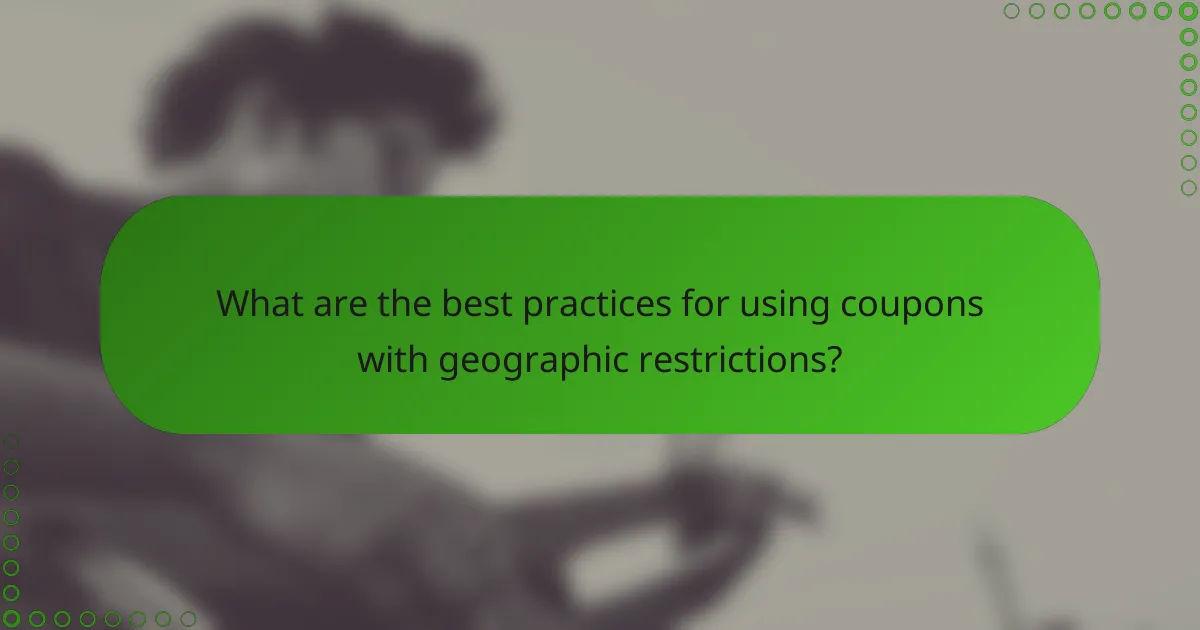
What are the best practices for using coupons with geographic restrictions?
To effectively use coupons with geographic restrictions, always understand the specific terms associated with the coupon and the location it applies to. This ensures you maximize savings while avoiding pitfalls related to invalid usage.
Check terms and conditions
Before using any coupon, review its terms and conditions carefully. Look for details on geographic limitations, as many coupons are only valid in certain regions or countries. For example, a coupon for a restaurant chain may only be applicable in specific cities.
Pay attention to any restrictions on usage frequency, minimum purchase requirements, or specific items that may be excluded. Understanding these details can help prevent disappointment at checkout.
Use location-based apps
Location-based apps can help you find coupons that are valid in your area. Many retailers offer apps that provide exclusive deals based on your geographic location. By enabling location services, you can receive notifications for nearby discounts.
Additionally, consider using coupon aggregator websites that filter offers by location. This can save time and ensure you only see deals that apply to you, enhancing your shopping experience.
Verify expiration dates
Always check the expiration dates on coupons with geographic restrictions. Some coupons may have limited validity, and using them after the expiration can lead to missed savings. Look for both the issue date and the expiration date to gauge how long you have to use the coupon.
In some cases, retailers may extend the validity of certain coupons, especially during promotional events. Always verify with the retailer if you are unsure about a coupon’s status to avoid any surprises at checkout.
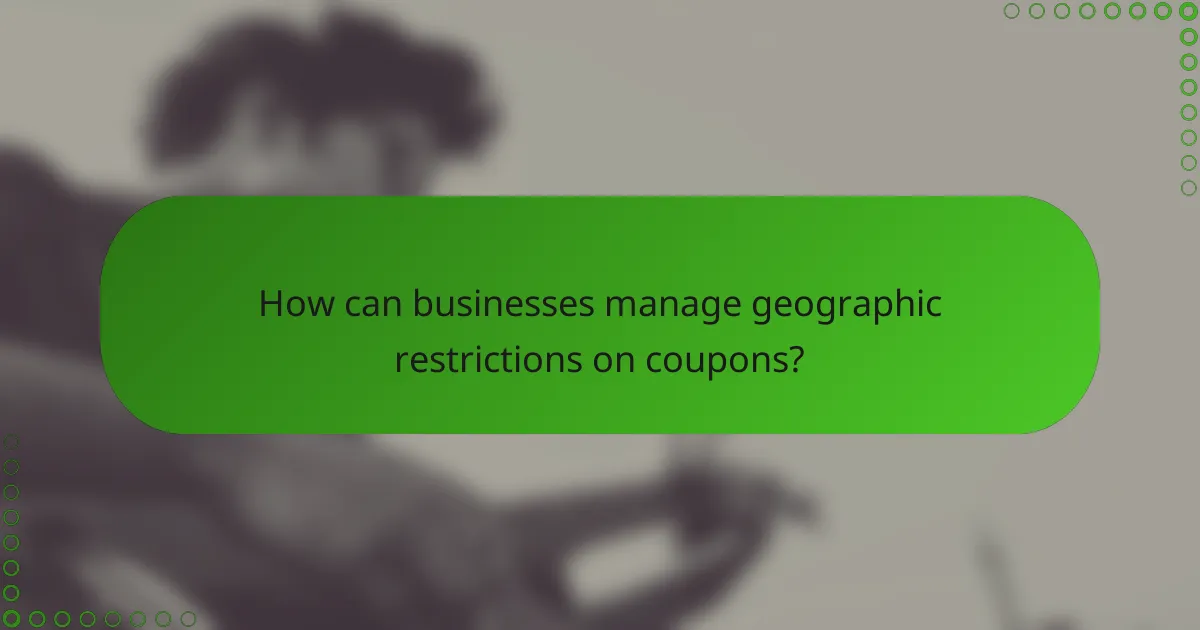
How can businesses manage geographic restrictions on coupons?
Businesses can manage geographic restrictions on coupons by implementing targeted strategies that ensure promotions reach the intended audience while complying with local regulations. This involves using technology and analytics to tailor marketing efforts based on regional performance.
Implement geo-targeting strategies
Geo-targeting allows businesses to deliver coupons to specific locations, enhancing relevance and effectiveness. This can be achieved through digital platforms that track user locations, enabling tailored offers based on proximity to stores or service areas.
For instance, a restaurant chain might offer a discount coupon only to users within a certain radius of its locations. This approach not only drives foot traffic but also minimizes the risk of misuse by customers outside the targeted area.
Utilize analytics for regional performance
Analytics play a crucial role in understanding how coupons perform across different regions. By analyzing data such as redemption rates and customer demographics, businesses can identify which areas respond best to specific offers.
For example, if a coupon for a seasonal product performs well in urban areas but poorly in rural regions, businesses can adjust their strategies accordingly. Regularly reviewing this data helps refine marketing efforts and allocate resources more effectively.
Adjust marketing campaigns accordingly
Based on insights gained from geo-targeting and analytics, businesses should be prepared to adjust their marketing campaigns. This may involve changing the type of coupons offered, the messaging used, or the channels through which they are distributed.
For instance, if a campaign is underperforming in a particular region, businesses might consider increasing the discount or promoting the offer through local influencers. Flexibility in marketing strategies ensures that businesses can respond to regional preferences and maximize coupon effectiveness.
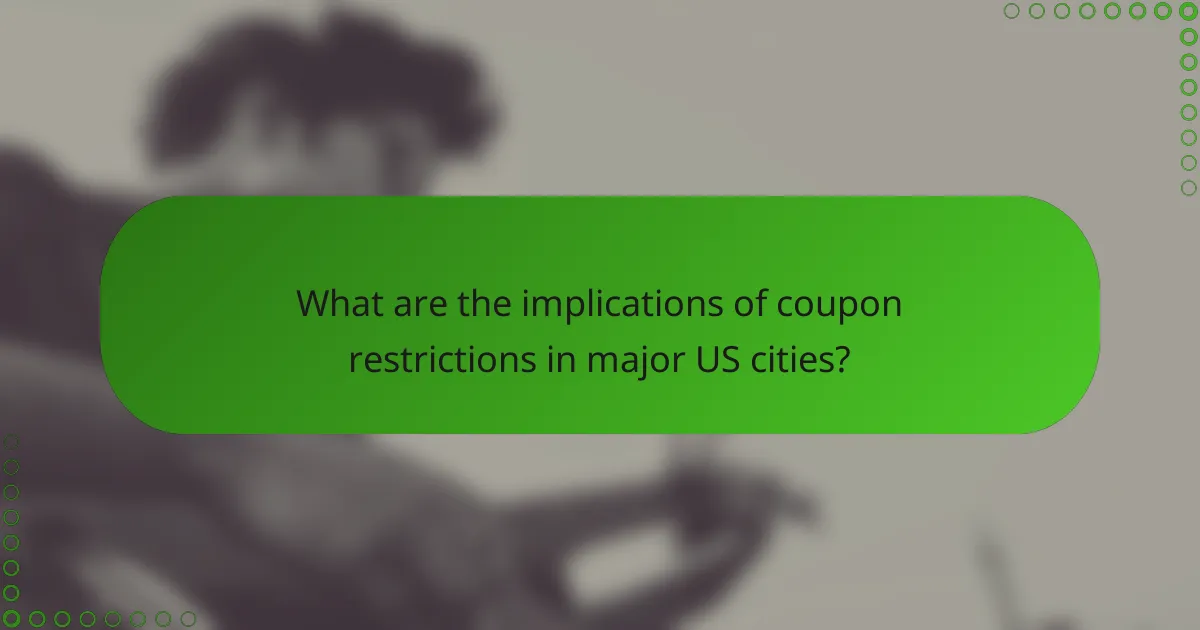
What are the implications of coupon restrictions in major US cities?
Coupon restrictions in major US cities can significantly affect consumer access and market dynamics. These limitations often dictate where and how coupons can be used, impacting both shoppers and businesses.
Variability in consumer access
Consumer access to coupons can vary widely based on geographic location. In densely populated urban areas, certain coupons may only be valid in specific neighborhoods or stores, limiting options for shoppers. For example, a coupon for a grocery store chain might only be redeemable in select locations, leaving consumers in other areas without access to the same savings.
This variability can lead to disparities in shopping experiences, where consumers in affluent neighborhoods may benefit from more promotional offers compared to those in less affluent areas. Shoppers should always check the fine print of coupons to understand their validity based on location.
Market competition effects
Coupon restrictions can influence market competition by creating uneven playing fields among businesses. Companies in cities with strict coupon regulations may find it harder to attract price-sensitive customers, while those in less regulated areas can leverage coupons more freely to boost sales. This can lead to a concentration of market power among a few retailers who can navigate these restrictions effectively.
Additionally, businesses may adjust their pricing strategies based on the availability of coupons. For instance, if a competitor offers a coupon that is widely accepted, other retailers may feel pressured to follow suit or risk losing customers.
Local regulations
Local regulations can impose specific limitations on coupon usage, affecting how businesses distribute and honor these offers. Some cities may have laws governing the expiration dates of coupons or the types of discounts that can be advertised. Understanding these regulations is crucial for both consumers and businesses to ensure compliance and maximize benefits.
For example, certain jurisdictions may require businesses to clearly disclose any restrictions associated with coupons, such as minimum purchase requirements or exclusions. Consumers should familiarize themselves with local laws to avoid confusion and ensure they are taking full advantage of available offers.
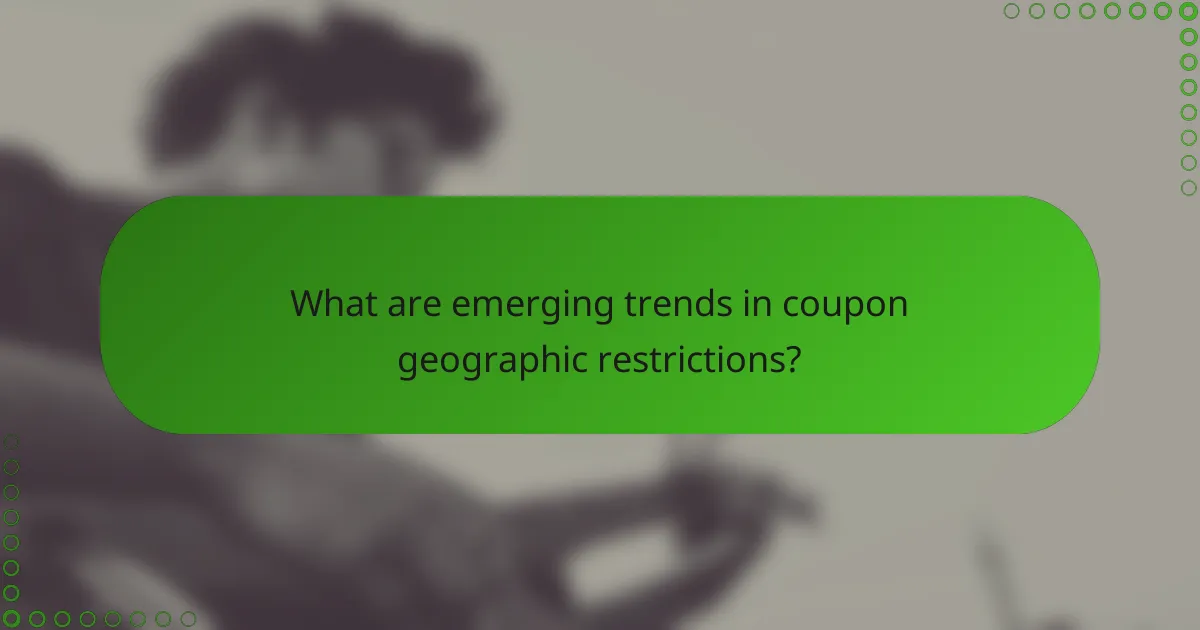
What are emerging trends in coupon geographic restrictions?
Emerging trends in coupon geographic restrictions indicate a growing focus on localizing offers to specific regions, enhancing customer engagement and compliance with regional regulations. Businesses are increasingly tailoring promotions to meet the preferences and legal requirements of different markets.
Increased Localization of Coupons
Many companies are adopting a strategy of increased localization for their coupons, which means creating offers that cater to the specific tastes and needs of local consumers. This approach not only improves relevance but also boosts redemption rates. For example, a restaurant chain might offer discounts on regional dishes in specific cities.
Regulatory Compliance and Restrictions
As businesses expand globally, understanding and adhering to local regulations regarding coupon distribution becomes crucial. Different countries may have specific laws governing promotional offers, including expiration dates and advertising standards. Companies must ensure their coupons comply with these regulations to avoid legal issues.
Digital Coupons and Geolocation Technology
The rise of digital coupons has been accompanied by advancements in geolocation technology, allowing businesses to target consumers based on their physical location. This trend enables brands to send personalized offers to customers’ smartphones when they are near a store, increasing the likelihood of conversion. For instance, a retail store might push a coupon to customers who are within a certain distance from their location.
Consumer Awareness and Preferences
Consumers are becoming more aware of geographic restrictions on coupons and are increasingly seeking out offers that are valid in their area. This awareness drives companies to be transparent about the limitations of their promotions. Brands that clearly communicate these restrictions are likely to build trust and loyalty among their customer base.


